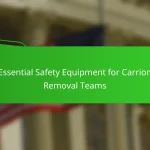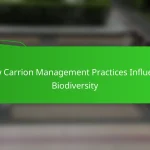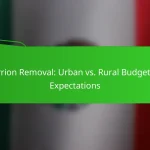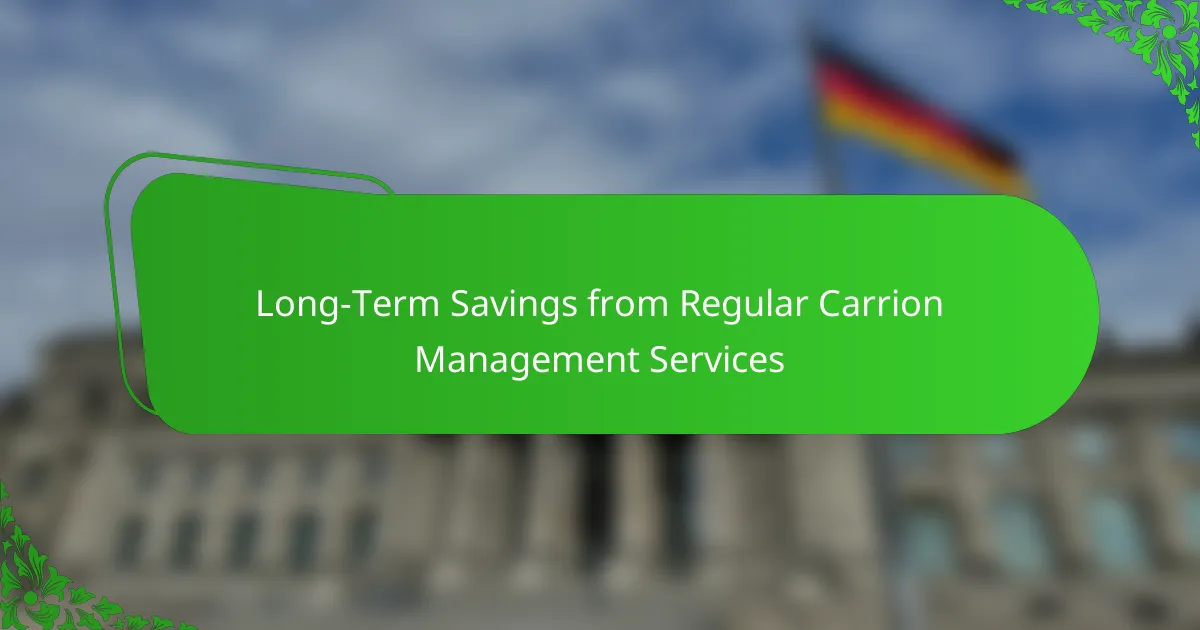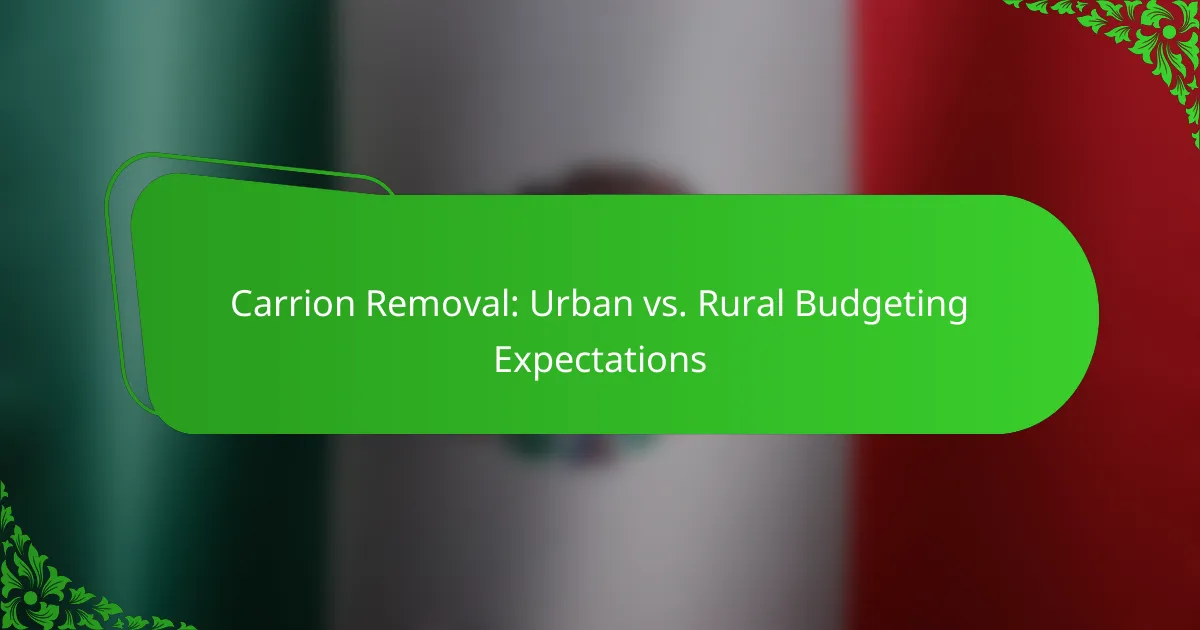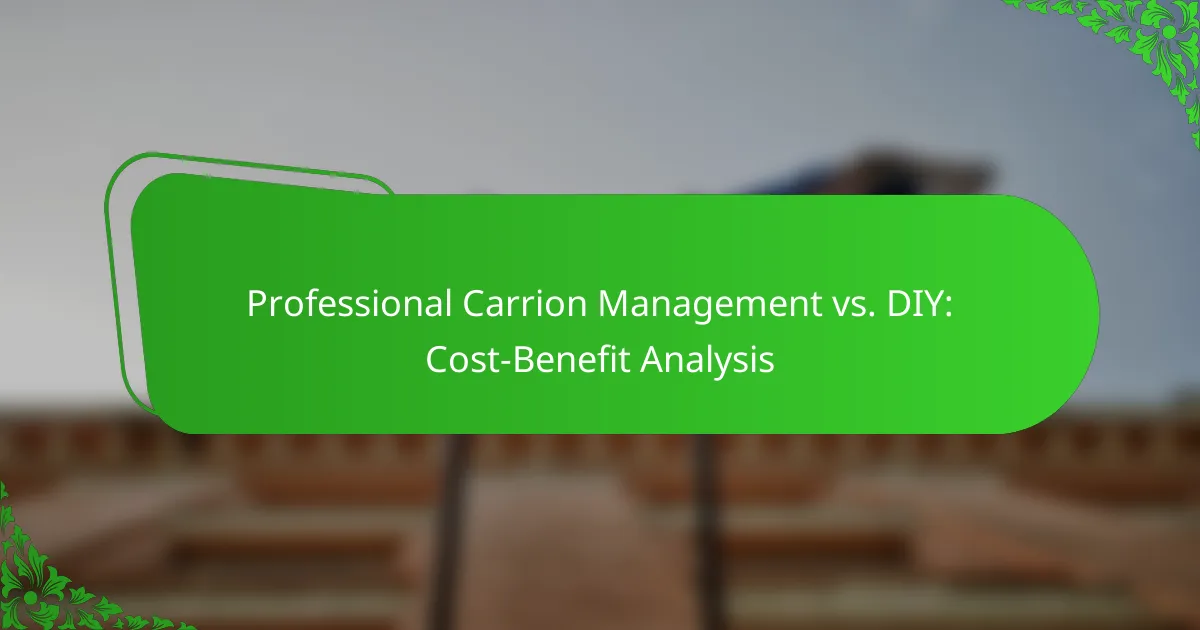Regular carrion management services play a crucial role in urban areas by significantly reducing costs associated with pest infestations and health risks. By efficiently addressing the presence of dead animals, these services not only protect public health and the environment but also help maintain property values and community satisfaction.

How can regular carrion management services save money in urban areas?
Regular carrion management services can significantly reduce costs for urban areas by preventing pest infestations, lowering health risks, and maintaining property values. By efficiently handling dead animals, these services minimize the financial burden associated with pest control and health-related issues.
Reduced pest control costs
Effective carrion management directly decreases the likelihood of pest infestations, such as rodents and insects, which are attracted to decomposing animals. By maintaining a clean environment, urban areas can save on pest control services that might otherwise be necessary to combat these infestations.
For instance, cities that implement regular carrion removal can see pest control costs drop by as much as 20-30%. This reduction can lead to substantial savings over time, especially in densely populated areas where pest issues are more prevalent.
Lowered health risks
Regular carrion management reduces health risks associated with decomposing animals, which can harbor diseases that affect both humans and pets. By promptly removing dead animals, urban areas can mitigate the spread of zoonotic diseases, which may otherwise lead to costly public health interventions.
Moreover, the potential for outbreaks of diseases like leptospirosis or salmonella decreases, saving municipalities from expenses related to healthcare and emergency responses. Investing in these services can ultimately lead to safer communities and lower healthcare costs.
Enhanced property value
Maintaining a clean and healthy urban environment through regular carrion management can enhance property values. Properties in well-maintained areas are often more desirable, leading to higher market prices and rental rates.
For homeowners and real estate investors, this means that investing in carrion management services not only protects their properties but also contributes to long-term financial gains. A clean neighborhood can attract new residents and businesses, further boosting local economies.

What are the benefits of consistent carrion management?
Consistent carrion management offers several key benefits, including enhanced public health, environmental protection, and increased community satisfaction. By regularly managing dead animals, communities can mitigate health risks, preserve local ecosystems, and foster a sense of well-being among residents.
Improved public health
Regular carrion management significantly reduces the risk of disease transmission. Decomposing animals can attract pests and harbor pathogens that pose health threats to humans and pets. By ensuring timely removal, communities can lower the incidence of zoonotic diseases and maintain safer environments.
To maximize public health benefits, it is essential to adhere to local regulations regarding carrion disposal. This may include using licensed services that follow proper sanitation practices, which can further minimize health risks.
Environmental protection
Consistent management of carrion helps protect local ecosystems by preventing pollution and maintaining biodiversity. Decomposing animals can lead to nutrient imbalances in soil and water, potentially harming wildlife and plant life. Regular removal minimizes these impacts, promoting healthier habitats.
Communities should consider integrating carrion management with broader environmental initiatives, such as wildlife conservation efforts. This holistic approach can enhance the effectiveness of both programs and ensure sustainable practices are followed.
Community satisfaction
Effective carrion management contributes to community satisfaction by enhancing the overall aesthetic and safety of public spaces. Residents are more likely to feel comfortable and proud of their surroundings when they are clean and free from unpleasant odors or sights associated with dead animals.
Engaging the community in carrion management initiatives, such as awareness campaigns or volunteer clean-up days, can further strengthen local ties and promote a shared sense of responsibility. This involvement can lead to increased satisfaction and a stronger commitment to maintaining a healthy environment.

What factors influence the cost of carrion management services?
The cost of carrion management services is influenced by several key factors, including how often the service is needed, the type of provider engaged, and the geographic location of the service. Understanding these elements can help businesses and property owners budget effectively for these essential services.
Service frequency
Service frequency plays a significant role in determining overall costs. Regularly scheduled pickups, such as weekly or bi-weekly, typically result in lower per-visit costs compared to one-time or emergency services. For example, a weekly service may cost around 10-20% less per visit than a monthly service due to the efficiency of established routes.
When planning for carrion management, consider the volume of waste generated in your area. Higher volumes may necessitate more frequent services, which can increase costs but also reduce health risks and odors associated with decaying matter.
Type of service provider
The type of service provider can greatly affect pricing. Larger, established companies may offer competitive rates due to economies of scale, while smaller, local providers might charge more for personalized service. It’s essential to evaluate the reputation and reliability of the provider, as cheaper options may not always deliver the same quality of service.
Additionally, specialized providers who handle hazardous materials or offer comprehensive waste management solutions may charge higher fees. Assess your specific needs to choose a provider that balances cost and quality effectively.
Geographic location
Geographic location significantly impacts the cost of carrion management services due to variations in local regulations, disposal fees, and transportation costs. Urban areas typically face higher service costs compared to rural regions due to increased demand and operational challenges.
In some regions, specific regulations may dictate how carrion must be managed, which can influence pricing. For example, areas with strict environmental regulations might require more advanced disposal methods, leading to higher service fees. Always check local guidelines to understand potential cost implications.
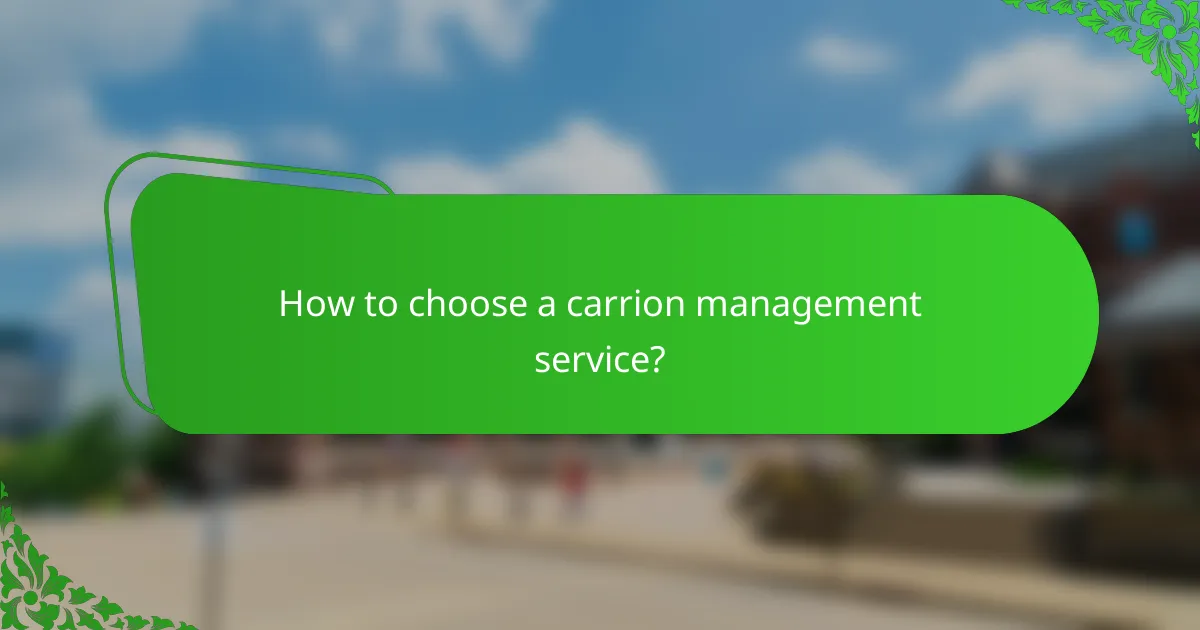
How to choose a carrion management service?
Choosing a carrion management service involves evaluating their reputation, pricing, and guarantees. These factors will help ensure you select a reliable provider that meets your specific needs and budget.
Evaluate service reviews
Start by researching customer reviews and testimonials for potential carrion management services. Look for feedback on their responsiveness, effectiveness, and overall customer satisfaction.
Consider checking platforms like Google Reviews or Yelp, as well as industry-specific forums. A service with consistently high ratings is more likely to provide quality management.
Compare pricing structures
Pricing for carrion management services can vary significantly based on factors like location and service scope. Obtain quotes from multiple providers to compare costs effectively.
Some companies may charge a flat fee, while others might use a per-incident pricing model. Be sure to clarify what is included in the price, such as disposal methods and follow-up services.
Assess service guarantees
It’s crucial to understand the guarantees offered by carrion management services. Look for providers that offer assurances regarding the thoroughness of their work and any follow-up support.
A solid guarantee can provide peace of mind, ensuring that the service will address any issues that arise after the initial management. Check if they comply with local regulations and standards for waste disposal, which can further enhance their reliability.
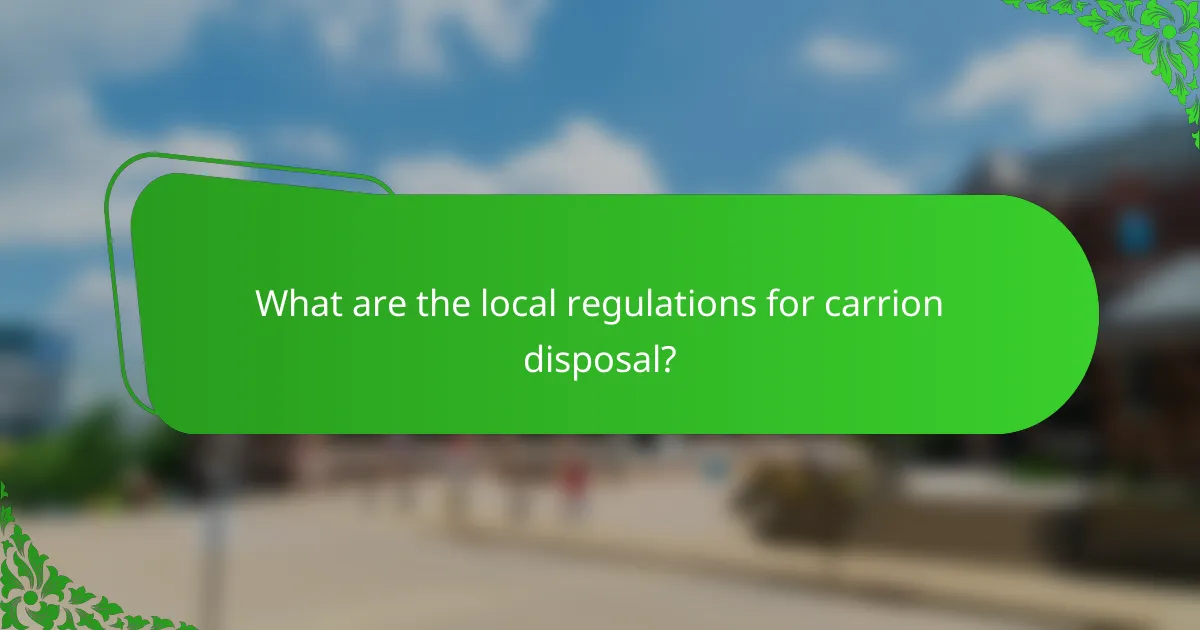
What are the local regulations for carrion disposal?
Local regulations for carrion disposal vary by region but generally require proper management to prevent health hazards and environmental issues. Compliance with these regulations is essential for both public safety and legal adherence.
City ordinances
City ordinances typically outline specific procedures for the disposal of dead animals, including the types of animals covered and the methods permitted. Many cities mandate that residents report deceased animals to local authorities or designated waste management services.
For example, in urban areas, ordinances may require that larger animals, such as pets or livestock, be disposed of by licensed professionals. Fines can be imposed for improper disposal methods, emphasizing the importance of following local laws.
Health department guidelines
Health department guidelines often provide detailed instructions on carrion management to minimize health risks. These guidelines may include recommendations on how to handle and dispose of carcasses safely, including the use of personal protective equipment (PPE).
In many regions, health departments recommend that residents avoid touching dead animals and instead contact local animal control or waste management services. This ensures that trained professionals handle the situation, reducing the risk of disease transmission and environmental contamination.
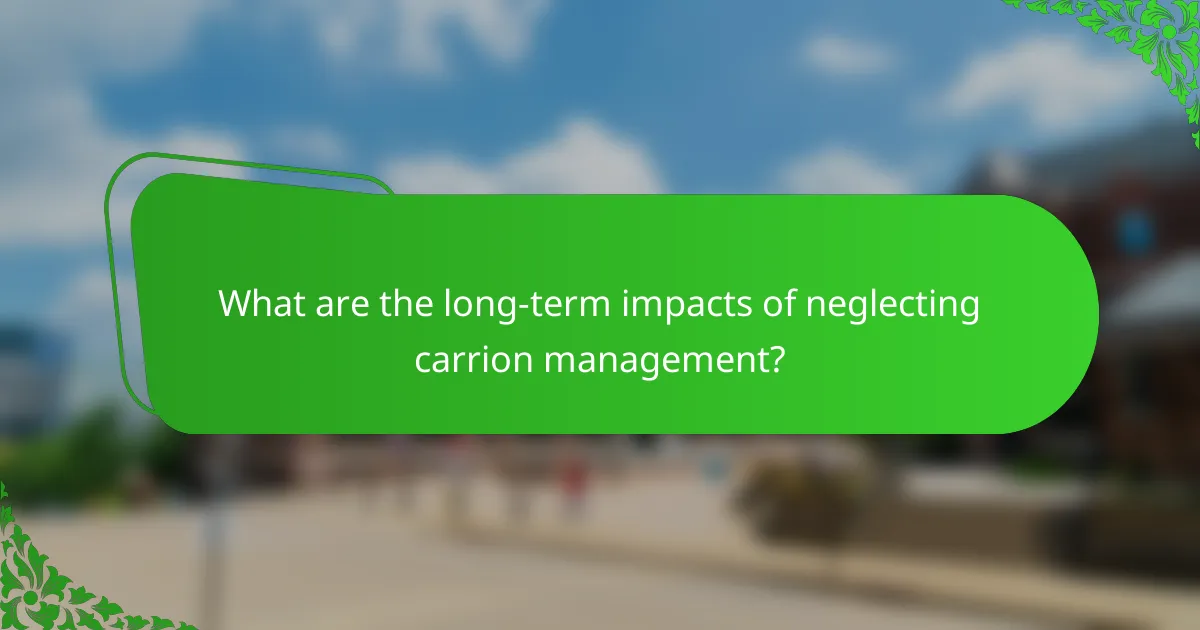
What are the long-term impacts of neglecting carrion management?
Neglecting carrion management can lead to significant long-term consequences, including health hazards, environmental degradation, and financial losses. Over time, unmanaged carcasses can attract pests, spread disease, and create unpleasant odors, ultimately affecting community well-being and property values.
Health Risks Associated with Unmanaged Carrion
Unmanaged carrion poses serious health risks as it can attract scavengers and pests that may carry diseases. For instance, rodents and insects drawn to decaying animals can become vectors for pathogens, potentially leading to outbreaks of zoonotic diseases. Communities may face increased healthcare costs and public health interventions as a result.
Environmental Consequences
The environmental impact of neglecting carrion management is profound. Decomposing carcasses can contaminate soil and water sources, leading to nutrient imbalances and harming local ecosystems. Over time, this can disrupt wildlife habitats and diminish biodiversity, necessitating costly restoration efforts.
Financial Implications of Poor Carrion Management
Ignoring carrion management can result in significant financial burdens for communities and businesses. The costs associated with public health crises, environmental cleanup, and decreased property values can accumulate quickly. Investing in regular carrion management services can help mitigate these expenses, ensuring a healthier and more sustainable environment.


